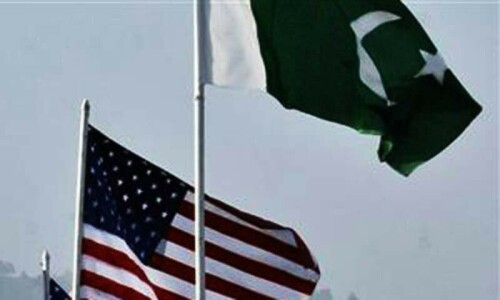• Over 2,000 polling stations declared sensitive or most sensitive
• Officials vow results to be out within an hour after polling ends
MUZAFFARABAD: In a highly charged atmosphere in the backdrop of allegations and mudslinging by the leadership of three mainstream contesting parties, over 3.22 million Kashmiri voters in Azad Jammu and Kashmir (AJK) and Pakistan will exercise their right to vote on Sunday (today).
In all, there are 3,220,546 (3.22m) votes registered in the 45 constituencies of the AJK Legislative Assembly. Among them, 2,817,090 voters are registered in 33 constituencies of the AJK assembly. Of the remaining voters, 373,652 are registered in the six constituencies representing the refugees from occupied Jammu and 29,804 are registered in the six constituencies representing the refugees from occupied Kashmir Valley. These 12 constituencies representing refugees from occupied Jammu and Kashmir Valley have a total of 403,456 registered voters.
Previously, general elections in AJK had predominantly been a contest between the local leaders of the contesting parties, with a low-profile support from their parent parties or like-minded governments in Pakistan.
However, of late these elections have become a do-or-die battle directly between the central leadership of the mainstream parties, relegating their local leadership as well as a few state-based parties to the background.
General elections in 2006 were the last electoral exercise that saw an indigenous and long-time ruling party — All Jammu and Kashmir Muslim Conference (AJKMC) — fight the Pakistan Peoples Party (PPP) to retain the power chair in Muzaffarabad.
Five years later the main contestants in the general elections were the PPP and the PML-N, the latter having been launched hardly seven months before the polls, while the AJKMC trailed at the third position.

The then prime minister Yousuf Raza Gillani, his cabinet members from the PPP, and Nawaz Sharif and his younger brother Shehbaz Sharif, the then Punjab chief minister, from the PML-N had toured different areas and addressed rallies and public meetings ahead of the polls as part of the campaign of their respective parties.
Pakistan Tehreek-i-Insaf (PTI) was launched in the AJK in 2015, just a year before the next general elections and it made its parliamentary representation when its regional president Barrister Sultan Mahmood contested and won a by-election after resigning from his assembly seat that he had clinched as PPP nominee in 2011.
The 2016 polls again saw verbal duels between the mainstream leaders, mainly PPP chairman Bilawal Bhutto-Zardari and the then federal ministers in PML-N government Pervez Rashid, Barjees Tahir and Dr Asif Kirmani, lending credence to the impression that the AJK elections had been hijacked by the Pakistan-based parties.
The PPP leadership had then repeatedly dubbed the then PM Nawaz Sharif as a traitor for being [Narendra] Modi’s friend. On behalf of the PTI, its chairman Imran Khan had also addressed a few events, though half-heartedly, wherein he had taken exception to the Sharif family for its alleged corruption.
However, this year the pre-poll campaign has surpassed the previous records of aggressiveness towards their rivals.
From June 25 when Mr Bhutto-Zardari took lead over the opponents in launching campaign of his party from Dadyal, followed by PML-N vice president Maryam Nawaz and federal ministers Ali Amin Gandapur, Murad Saeed and PM Khan, to July 23 when the campaign ended at midnight, electorate in AJK heard nothing but allegations, counter-allegations and usual mudslinging in rallies.
While the PPP and the PML-N played Kashmir card by accusing PTI leadership of failing to take any substantial action in response to India’s Aug 5, 2019 move against occupied Kashmir and also planning to convert AJK into a province of Pakistan, Prime Minister Imran Khan in his four appearances in AJK levelled corruption allegations against opponents.
“They spewed venom at each other during their speeches... There was much empty rhetoric on Kashmir but no word on the myriad of issues faced by the people in Azad Jammu and Kashmir as well as their likely solutions,” commented Abdul Hakim Kashmiri, a political analyst based in Muzaffarabad.
The campaign also saw the helplessness of the AJK Election Commission before Mr Gandapur, who it had banned from attending any event in AJK after allegations of distribution of money, announcement of development schemes and use of abusive language in violation of the code of conduct, but to no avail.
Ms Nawaz also hurled allegations of vote theft by PTI despite the fact her own party has been in power in AJK until the installation of the next government.
The Election Commission while dismissing such allegations asserts that watertight security and other measures taken by it leave no room for rigging.
Farhat Ali Mir, one of the two constitutional members of the commission, told reporters on Saturday that the presiding officers were under an obligation to provide duly signed results of their stations to the agents of all contesting candidates, immediately after the counting, thus eliminating chances of results manipulation.
By Saturday evening, polling material had been dispatched to all respective stations — 5,129 in total, of which 826 had been declared the ‘most sensitive’ and 1,209 as ‘sensitive’ stations.
Polling, which is scheduled to begin at 8am, will conclude at 5pm while results at the polling stations will be announced within an hour after the polling ends, according to the commission officials.
Published in Dawn, July 25th, 2021















































